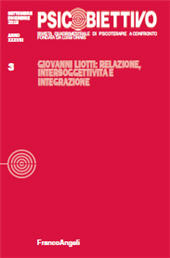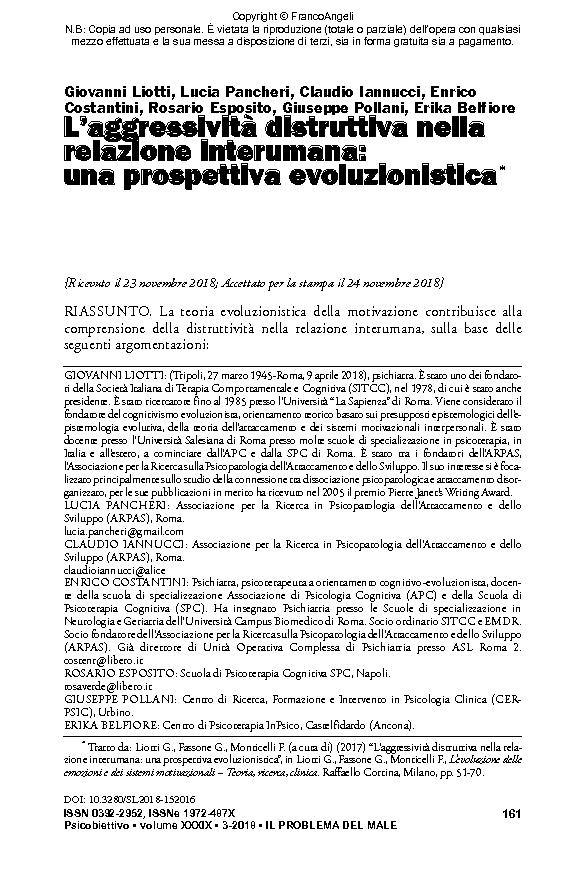L'aggressività distruttiva nella relazione interumana : una prospettiva evoluzionistica
161-173 p.
La teoria evoluzionistica della motivazione contribuisce alla comprensione della distruttività nella relazione interumana, sulla base delle seguenti argomentazioni: - esiste una forte tendenza, comparsa nel corso dell'evoluzione come strategia evoluzionisticamente stabile (SES), a inibire l'aggressività distruttiva negli scontri fra conspecifici; - alcune condizioni ambientali definibili sociologicamente, e nell'uomo anche condizioni definibili psicologicamente perché legate a particolari contesti relazionali in cui avviene lo sviluppo della personalità, possono indebolire tale tendenza fino ad annullarne gli effetti; -nell'indebolimento del meccanismo inibitore della violenza (MIV), come anche nel suo potenziamento, intervengono le motivazioni e le funzioni mentali superiori, tipicamente sviluppatesi nell'uomo come pennacchi evoluzionistici; -
l'indebolimento del MIV causa la comparsa delle due forme di distruttività che possono affliggere la relazione interumana, connesse rispettivamente al sistema di difesa per la sopravvivenza e al sistema predatorio; - la conoscenza delle sequenze comportamentali ed emozionali caratteristiche dei due sistemi aiuta a riconoscere clinicamente le due forme di distruttività interumana nello studio della psicopatologia. [Testo dell'editore].
The evolutionary theory of motivation contributes to the understanding of destructiveness in the interhuman relationship, based on the following arguments: - there is a strong tendency that appeared in the course of evolution, as an evolutionarily stable strategy (ESS), to inhibit destructive aggression in clashes between conspecifics; -some environmental conditions which can be defined sociologically and in humans can also be defined psychologically as they are linked to particular relationship contexts in which the personality development takes place, can weaken this tendency to the extent to cancel its effects; - in the weakening of the inhibiting mechanism of violence (MoV), as even in its empowerment, motivations and higher mental functions intervene, which typically develop as evolutionary plumes; - the weakening of MoV causes the actualization of two forms of destructiveness that can afflict the interhuman relationship,
which is respectively connected to defense system for survival and the predatory system; - the knowledge of the behavioral and emotional sequences, characteristic of the two systems, helps to clinically recognize the two forms of interhuman destructiveness in the study of psychopathology. [Publisher's text].
-
Articles from the same issue (available individually)
-
Information
ISSN: 1972-487X
KEYWORDS
- Teoria evoluzionistica delle motivazioni (TEM), aggressività inter-specifica, distruttività, meccanismi inibitori della violenza (MIV), predazione
- Evolutionary Theory of Motivations (ETM), Aggression Inter-Speci-fic, Destructiveness, Inhibitory Mechanisms of Violence (MoV), Predation



